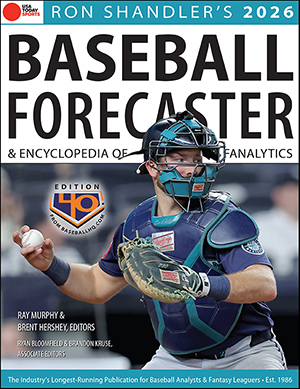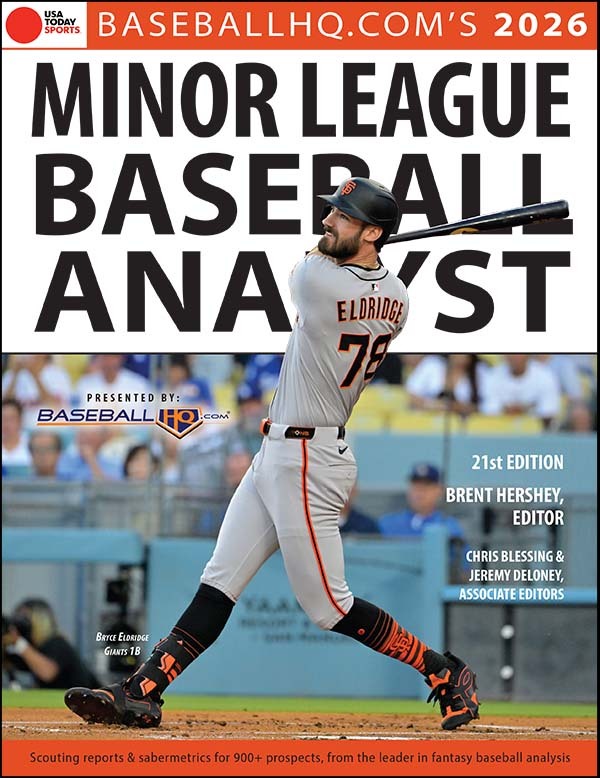
(*) MASTER NOTES: Good skills, bad team
On Wednesday, I was listening to a game between the Twins and the Angels in Anaheim. My wi-fi router was acting up, repeatedly dropping the signal and forcing reboot after reboot. Perhaps it was trying to prevent me from subjecting myself to a game between the worst team in the American League and the third-worst.
But that’s because my router doesn’t understand fantasy baseball. As you probably suspect, the reason I was tuning in was that I had a pitcher going—Tyler Duffey of the Twins is also part of the struggling rotation on my Tout Wars-AL team.
After Duffey was knocked out of the box in the fifth, and I was finally turning off the game, I thought that I need to pay more attention to team realities when I’m deciding what to do with a particular starting pitcher. It would be hard to calculate into starting-pitcher xERA the strength or weakness of a team’s defenders, relief pitchers or official scorers, but those things clearly matter. Sometimes a lot.
Let me tell you about Duffey’s game against the Angels. But first, some background. After a very promising start to the season, with an ERA in the low threes, Duffey had been maddeningly awful. Coming into that Angels start, he had just two wins in nine starts, a 5.33 ERA, and a 1.49 WHIP. Yecccch.
But remember, I did say these putrid stats were “maddening,” and here’s why: Duffey’s skills were actually pretty good. Stephen Nickrand, BaseballHQ.com’s excellent pitching analyst, had written just days earlier: “(S)ome very roster-worthy skills underneath his poor surface stats: 8.4 Dom, 2.1 Ctl, 46% GB%, 119 BPV.” Stephen went on to point out the problem seemed to be Duffey’s poor luck, arguing that his stats had been “sabotaged (by a) 36% H% and 16% hr/f” and, I would add, a 66% strand rate.
But, as I was reminded on Wednesday night, there’s more to “luck” than luck. There’s also team-level, across-the-board incompetence. And in this game, that’s what did in Tyler Duffey—and makes me wonder if his results will ever catch up to his skills as long as he’s on that team.
He opened the game with three scoreless innings. In the fourth, the Angels scored twice on an error and general defensive malfeasance by Twins SS Eduardo Núñez.
In the fifth, the wheels came off. Yunel Escobar doubled, Kole Calhoun flied to right, and Mike Trout was walked intentionally. Albert Pujols grounded into an inning-ending double play, but he had used his veteran wiles to shrewdly aim his grounder toward Nunez, and thereby got a single. With the bases loaded, C.J. Cron singled Escobar home with a short looper out behind second.
With one run in and the bases still loaded, manager Paul Molitor was apparently worried that Duffey would give up more baserunners by allowing the Angels to continue hitting ground balls toward Nunez.
Duffey was up against a pitch count around 100, which seems to be the club’s limit for him, so Molitor, not wanting to see if his young starter could work out of the jam, instead diabolically inserted lefthanded reliever Taylor Rogers, presumably to provide the platoon advantage over the lefty-hitting Calhoun. Unfortunately, Rogers would have to face five straight right-handed hitters before Calhoun’s slot was due. This was not great for the Twins, since Rogers OPS versus righties is about 200 points higher than Duffey’s.
Rogers began his stint by making the whole left-right thing moot, walking Jefry Marte on five pitches, forcing Trout to the plate and forcing an earned run onto Duffey’s book.
Giavotella struck out looking. Then Jett Bandy (and there’s a name) lofted a can of corn to short right towards rookie OF Max Kepler, a guy who shares a surname with one of history’s greatest astronomers. But Kepler sure didn’t calculate the orbital path of this particular celestial body: He sprinted in aggressively, skidded comically to a stop a few feet into foul territory, and watched helplessly as the little leather meteorite thudded to the earth behind him, a few feet fair.
Remarkably, by the conventions of modern scoring, this obvious defensive blunder was scored a hit. Yes, you heard correctly: A simple fly ball landing on the ground despite the nearby presence of a major-league outfielder is not an “error,” even though the right-fielder on your average office softball team would make the play 9,999 times out of ten thousand, even if he had to get out of his lawn chair to chase the ball. Thus another inept defender, with the help of an inept scorer, added two more earned runs onto Duffey’s sheet. He was still giving up earned runs 15 minutes after he had left the field.
(By the way, Bandy now has an OPS almost two thousand points higher versus lefthanders than righthanders. Just sayin'.)
Molitor is not entirely to blame. He didn’t have much in the way of choices. When he calls to the bullpen, he must hope nobody's home. Twins’ relievers have a combined ERA of 4.58, fifth-worst in MLB (the Reds are at a truly historic 6.28, by the way). And while they are only slightly worse than the 31% league average in allowing inherited runners to score, Twins relievers have so far allowed Duffey’s runners to romp home at a 54% clip—13 baserunners inherited, seven scored. If the Twins relievers had managed to restrict Duffey's runners to the usual 33% overall scoring rate, they would have saved Duffey 3 ER, and reduced his ERA for the season by half a run.
Now, none of this is to suggest that Tyler Duffey has been good. He has given up too many hits, especially HR (and doubly especially HRs with men aboard—his HR/9 doubles with runners on). He seems to panic when faced with difficult situations, to lose his cool.
Still, his xERA is 3.95, 1.60 runs better than his actual ERA. Even after the disaster in Anaheim, his BPV is 105—that’s 25 points above the median starter (at least one QS) and almost 30 above the average. His BPV is above such luminaries as early Cy Young candidate Danny Salazar, Drew Pomeranz, Michael Fulmer, Cole Hamels, Chris Tillman and Jake Odorizzi.
And there’s the dilemma. Tyler Duffey is actually pretty good. But he doesn’t seem to have a path to being good now.
I wonder how many of his hits (and those of other Twins pitchers, including Kyle Gibson, who also has a spot on my Tout roster) would be outs but for the Roberto Duran manos de piedra fielding of Nunez and Kepler. His team can’t get outs from routine grounders to short or cans of corn to right, and the sad spectacle of Miguel Sanó lumbering around the OF in other Twins games does not make for a positive outlook on that front.
And I wonder how many of Duffey's inherited runners will continue to score if the manager puts in southpaws to face strings of RH hitters, because more broadly he doesn’t have relievers who can get batters out.
Ordinarily, I’d probably just stream Duffey against weaker opposition. But they don't come much weaker than the Angels. Only the A's (not counting the Twins themselves, for obvious reasons) are worse offensively than LA. Can I afford to use a reserve slot on a pitcher whom I can only stream only for starts against Oakland?
But I can’t worry about that right now. Gibson is going the hill against the Yankees. And dammit all, my wi-fi router is working perfectly.
---
Postscript: Gibson pitched OK, allowing only one run through six before tiring in the seventh. With two on, the Twins brought in their best reliever, Fernando Abad. He gave up a three-run jack to the first hitter he faced, notorious slugger Didi Gregorius.





-300x200.png)



